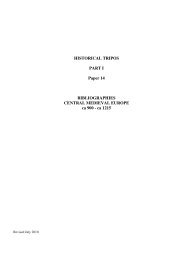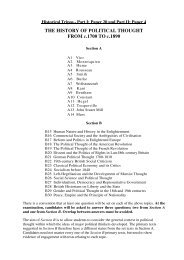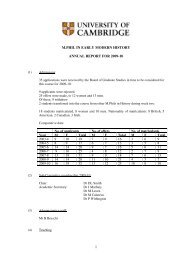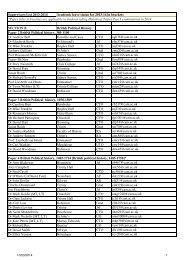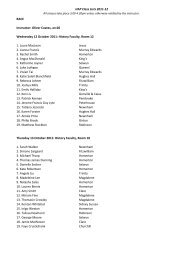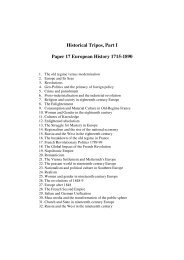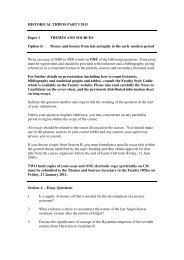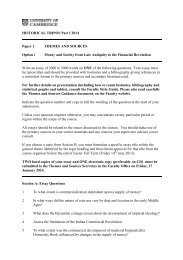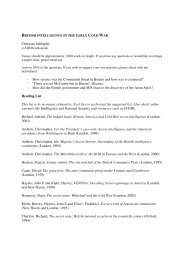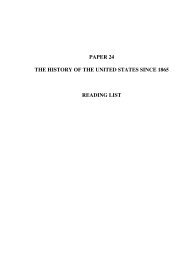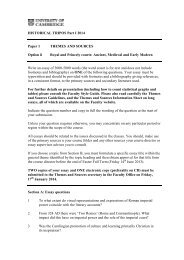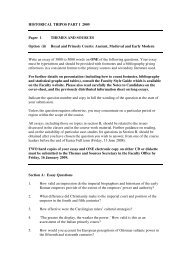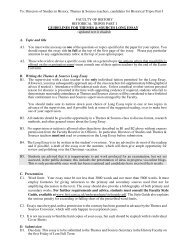Course Handbook - Faculty of History - University of Cambridge
Course Handbook - Faculty of History - University of Cambridge
Course Handbook - Faculty of History - University of Cambridge
Create successful ePaper yourself
Turn your PDF publications into a flip-book with our unique Google optimized e-Paper software.
commas. Longer foreign passages should be treated as quotations, i.e. should be in roman type with<br />
quotation marks. Translations <strong>of</strong> quoted material that is not in English should be provided in the footnotes.<br />
Numerals<br />
Spell out all numbers up to ten (e.g. five hospitals, ten years ago; but 18 days, 404 parishes), except when<br />
used in groups or in statistical discussion (e.g. ‘75 voted for, 39 against, and 30 abstained’). Use words<br />
rather than figures to start a sentence.<br />
Thousands take a comma: ‘5,000'. Use 0.15 rather than .15.<br />
Note the use <strong>of</strong> elisions: 101-2; 1568-9. Numbers in the teens are not fully elided: 115-16; 1611-12.<br />
Dates<br />
Express dates as follows in the text: 12 December 1770 (i.e. do not use the form December 12th, 1770).<br />
Decades should be referred to as 1660s (not 1660’s).<br />
Use 1534-5 (not 1534-35), but for years in the teens use 1513-14 (not 1513-4). In B.C. references the full<br />
dates must be given, e.g. 250-245 B.C (not 250-45 B.C.). Use ‘between 1641 and 1650’ and ‘from 1641<br />
until 1650’ or just ‘1641-60’, but not ‘between 1641-50’ or ‘from 1641-50’.<br />
Place a comma before dates when citing titles <strong>of</strong> books and articles: A history <strong>of</strong> Hungary, 1810-1890.<br />
When referring to centuries, be aware <strong>of</strong> the distinction between ‘the court in the sixteenth century’ (noun,<br />
without hyphen) and the ‘sixteenth-century court’ (adjective, with hyphen).<br />
When abbreviating months in footnotes, note that the standard abbreviations are: Jan., Feb., Mar., Apr.,<br />
May, June, July, Aug., Sept., Oct., Nov., Dec.<br />
Currency<br />
Words should be used to express simple sums <strong>of</strong> money occurring in normal prose: ‘the manuscript was sold<br />
for two shillings in 1682’. Sums <strong>of</strong> money which are cumbrous to express in words, and sums occurring in<br />
statistical tables etc. should be expressed in figures. British currency prior to 1971 should be shown in the<br />
following form: ‘The value <strong>of</strong> the goods stolen was £3 4s 8d’.<br />
British decimal currency should be expressed in pounds and new pence, separated by a full stop and not a<br />
comma: ‘£5.00’. Sums below one pound can be shown as ‘84p’ or ‘½p’ (note no full stop after ‘p’).<br />
Abbreviations may be used for the more familiar foreign currencies where it is not appropriate to express<br />
sums in words. Do not use £ for lire or livres, use li. instead. Always make it clear what currency you are<br />
using, particularly when there may be confusion, e.g. livres tournois and livres parisis, US $ and Canadian $.<br />
Punctuation<br />
The serial comma is preferred (‘red, white, and blue’ rather than ‘red, white and blue’).<br />
The addition <strong>of</strong> a possessive - ‘s following a name ending in -s is preferred (e.g. Dickens’s, Jones’s, rather<br />
than Dickens’, Jones’), except that people in the ancient world do not carry the possessive final ‘s, e.g.<br />
Sophocles’, Jesus’.<br />
Note that plainly parenthetical clauses or phrases require commas both before and after them; if in doubt<br />
about comma placement in these and other cases you are advised to consult Fowler’s English Modern<br />
Usage. Round (not square) brackets should be used for brackets within brackets. Square brackets should be<br />
reserved for editorial interpolation within quoted matter.<br />
Capitalization<br />
In general, use lower case wherever possible, but do not take this policy to extremes.<br />
Use lower case for titles <strong>of</strong> books and articles (except for the initial letter), but not for journals and<br />
newspapers, where each significant word carries a capital. E.g. ‘In his book The making <strong>of</strong> peace he argued<br />
in favour; but, writing in The Sheffield Gazette, he declared that ...’ Note that newspapers include the definite<br />
article in their titles when cited in the text, e.g. The Guardian, The Observer, The Lancet; but without the<br />
definite article in footnotes, e.g. Guardian, 14 Aug. 1964, p. 8.<br />
Use lower case for titular <strong>of</strong>fices: the king, sultan, monarch, pope, lord mayor, prime minister, foreign<br />
secretary, bishop <strong>of</strong> Durham, chiefs <strong>of</strong> staff, duke <strong>of</strong> Portland. But use upper case to avoid ambiguity (the<br />
Speaker, the British Resident). Use upper case in personal titles only when they immediately preface names<br />
(Pope John, King William, Duke Richard, Viscount Andover, Bishop Outhwaite). E.g. ‘The earl <strong>of</strong><br />
30




